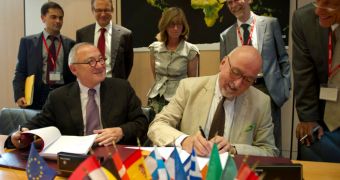At a meeting held at the European Space Agency (ESA) Headquarters, in Paris, officials from the European Union signed a document that secured €104 million for initial operations of the space component for the Global Monitoring for Environment and Security program.
The document was signed by the director general of the European Commission DG Enterprise and Industry, Heinz Zourek, and by the director general of ESA, Jean-Jacques Dordain.
With this critical step behind them, ESA officials can now focus on the task at hand, which is slowly and gradually bringing the entire GMES program online. All necessary funds for the early stages of the project have now been transferred.
The GMES program is tremendously complex. It will include five dedicate satellite families, all of which are to be launched within the next few years. The backbone of the entire operation will be the Sentinel spacecraft.
ESA's part in this extraordinary endeavor consists of developing, launching and operating the satellites, and of making all the data they produce available for GMES scientists. Information packs from already-deployed satellites will be included into the program as well.
The primary purpose of the project is providing European authorities with accurate and timely information services, that will aid officials manage the environment, understand and mitigate the effects of climate change, and ensure civil security.
“This transfer of funds to ESA, which has been appropriated from the EC’s Seventh Framework Program and GMES Initial Operations Program, will bridge the gap until the next Multi-annual Financial Framework comes into play in 2014,” an ESA press release reads.
“The first three Sentinel missions are designed to orbit in pairs, thereby offering maximum coverage of Earth's surface. This latest injection of funds will cover the costs for operating the first satellites until the new operational EU funds become available,” the statement adds.
“It will also provide initial funds that will allow the preparation of contracts for the launch of the second satellites that make up the Sentinel pairs,” the release concludes.

 14 DAY TRIAL //
14 DAY TRIAL //